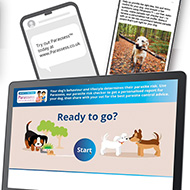
New tool to make parasite risk-assessment easier.
A new interactive tool has been released to help dog owners understand the importance of parasite control, and provides a personalised risk checker.
Created by Boehringer Ingelheim Animal Health, the tool – named ParassessTM – aims to support practices in engaging dog owners in parasite protection and helping veterinary professionals to save time when assessing and managing parasite risk.
ParassessTM, which is free to use, asks owners to complete a short user-friendly risk assessment on factors such as lifestyle and environment, which the tool's algorithm then uses to determine the dogs' individual risk level for fleas, ticks, lungworm, roundworms and tapeworms.
Questions asked include age, whether the dog is neutered, whether the dog is allowed off-lead or off-path when on walks, other pets in the house, habitats visited and interest in creatures such as snails or slugs.
Once the questionnaire has been completed, the tool generates an easy-to-read risk profile, which individually assesses the risk for each type of parasite.
Completed prior to a veterinary appointment, the report generated by the tool can be shared with the dog's veterinary surgeon, who can then make recommendations accordingly.
The new tool comes as part of the company's 'What's the Risk' campaign, providing advice, information and tools to support veterinary practices with parasiticide prescribing. Dog owners and veterinary professionals can visit parassess.co.uk for further information, and to access the tool.
Image (C) Boehringer Ingelheim Animal Health UK



 BSAVA is to partner with BVA Live (11-12 June 2026) to champion clinical research.
BSAVA is to partner with BVA Live (11-12 June 2026) to champion clinical research.